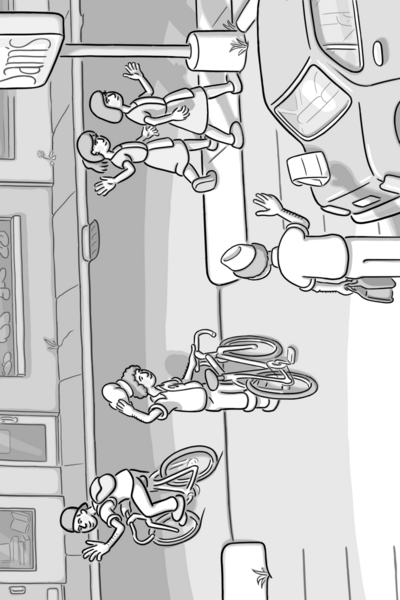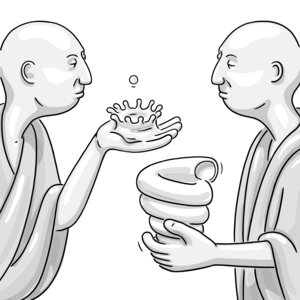Deben was a high school classmate of mine. I hardly knew him, but our lives turn out to have been linked in some way. He was somewhat better looking than me, and less thin of wrist, but he was from the Fort, which by the standards of affluent suburbia, was rough.
I have only two distinct memories of Deben, the first of which took place at a cross-country meet, where the two of us stood among the spectators cheering on the last pitiful stragglers in the race. Some kids from the opposing school were heckling our runners, and Deben, standing among his Fort pals was indignant, and made some angry proclamation about the ignobility of trying to win by impeding your opponents rather than by improving your own performance. I, too, was confounded by the hecklers, but my thoughts centered on the silliness of caring about the performance of kids who ran even slower than I did.
My other memory of Deben was from a class called “Practice of Creative Writing”. Each student was to read, aloud, a free verse poem that they had written about an animal. My poem, titled “King Penguin” was clever and amusing and it was a hit. I had waddled and craned my neck as I read it, and afterwards I had basked in the praise of my peers, a joy which does not diminish.
Deben had the misfortune of reading immediately after me, and his poem, also about a bird, was read halfheartedly. Despite its poignancy, “The Pigeon” lacked style and was mostly ignored. Remembering my classmate’s nobility of heart, I magnanimously offered some praise, but everyone focused on the fact that some of his lines rhymed, then returned to praising the penguin.
* * *
Three years later I was at Dartmouth, and editor of “The Dryad”, an avant-garde literary magazine. After “King Penguin” my star had continued to rise, and now, as a college sophomore, I was even beginning to experience some success in submitting works to mainstream publications.
Deben was studying management at Northeastern, and working evenings. He had worked at Sam’s all through high school, and had moved up from dishwasher to bus-boy to assistant manager.
It wasn’t the ivy league, but it was a dignified existence for a boy from the Fort… and Deben had high hopes. He had an A minus average, and he was well respected by the kids who worked for him, and most importantly he had a girlfriend, Rona, who was a freshman at Harvard.
It was obvious to everyone, including Rona herself, that she was out of Deben’s league, but she had seen something in him. I was the third youngest author ever to get published in Harpers, and she was out of my league too.
* * *
Rona was better looking, smarter, and just as tall as Deben, so when she stopped into Sam’s with a few of her friends, a connection was unlikely. She was impressed by the mixture of kindness and authority he exhibited towards his workers, and by their obvious respect for him. The mismatch was so great, though, that Deben was completely at ease, and when Rona made some erudite quip at him, he answered honestly that he didn’t know what the word “tautology” meant, but that she could explain it to him when she took him out to dinner.
The proposition had been made so dismissively that there was no pressure, and everyone, Rona included, was surprised when she handed him her phone number. Six Months later they were sharing an apartment in Alston.
If Rona had been the woman she was to become five years later, then the relationship might not have faltered, but a confluence of minor incidents, along with her youth, and the subtly discouraging remarks of her Harvard friends, eventually came into phase.
In the Summer between Deben’s junior and senior years, the two were to drive across country in his little blue car, but two months before the trip, Rona’s college professor father, who was unaware of these plans, came to her with an opportunity to spend this time working with a prominent scientist in Cambridge England.
Deben’s disappointment at the anticipated cancellation of the trip, coupled with the magnitude of the opportunity in England started what was to to become a death-spiral for the couple. Deben’s manner became subtly rougher, and his low-class accent began to bother Rona for the first time.
The relationship that everyone had considered doomed, finally broke one evening at Sam’s, when Rona overheard Deben using an ethnic slur. It was innocent, but she never gave him a chance to explain, and it is not given to us to know one another’s emotional states. “You can take a boy out of the Fort...” she thought.
* * *
Deben’s stock had fallen somewhat, but he held on to his dignity, and the mere fact of having been associated with Rona cast an enduring aura of success. Trina, a high school senior who waited tables at Sam’s, wasted no time in exploiting the opening.
Deben was generally stolid and reserved, but his recent breakup had engendered a measure of recklessness, and he succumbed to the charms of his coworker. He reasoned that in less than two months they would be fellow college students, and it seemed silly to quibble about an age difference of 2.8 years.
Invariably the liaison with Trina became public knowledge. Mr Millings, who owned Sam’s, never stated so directly, but this was the deciding factor in Deben not being given the job of manager. Despite this setback, though, little of substance had changed about Deben’s prospects, and now, provisionally staying on a friend’s couch, he still had every hope of making good on his ambitions.
* * *
That summer an excellent opportunity presented itself, and through the interventions of a friend, Deben was offered a supervisory job at a massive public works project underway in the city. Millings, who had always liked Deben, and perhaps having had a premonition, tried to keep him at Sam’s. But the construction job paid four times what he could pay, and the effort was insufficient.
Three weeks later, Deben was at the bottom of a trench, wearing a hard hat. The supervisor job had not yet opened, but a small delay seemed trivial, and it was appropriate that Deben should learn the nuts and bolts of the business. In any case, it was a chance for Deben to connect with his roots, and with overtime, a slopper could earn even more than a foreman.
Deben told himself that every man should work with his hands at least once in his life, and following a similar line of reasoning, I too was working construction that summer. Both of us worked hard, but though I earned less than half the money, I would not have traded places. My evenings were spent skinny-dipping in the river, and reading poetry in coffeehouses, while Deben’s were spent drinking beer with people whom I and my companions would have thought loutish had such thoughts been permissible.
* * *
That Deben had fallen into a gravity well, was now becoming evident, but he was unusually resilient against the expectations of others, and it wasn’t for another ten years that the last vestige of his aspirations finally left him.
Now in his early thirties, Deben was a crew foreman in all but title. He carried a clipboard, and got paid extra, but for “political reasons” was still technically a slopper. He still diligently performed all of the actions needed to maintain his college credits, kept a tidy apartment, and often on Saturdays visited the museum with his fiancee, an activity that Rona had introduced him to.
Coincidentally, it was on one such day that I met Rona at an award ceremony. She avoided such events, but was obliged to be at this one as she was guest of honor. Our conversation was a painful five minutes of me trying to sound interesting, and her trying to seem interested. I was a widely published past honoree, as well as a regular guest on public radio, but she was unmoved by credentials.
The following Monday, there was trouble at the construction site. Some reporter investigating cost and schedule overruns. The issue was a touchy one for Deben, who had always made sure that his crew gave the city the good work it was paying for. He would have been sympathetic to the reporter had he not become a prime target.
A high school graduate getting paid 60K per year for unskilled labor seemed like a perfect example of the shameless largess that plagued the project. That Deben had taught himself the basics of geotechnical engineering, and that his crew had delivered better value for the dollar than any other on the project was not readily evident.
* * *
Two weeks later Deben had lost his fiancee, and was back in a trench doing what he was told, and no more. The previous Monday he had missed his last chance to register for a night class, and maintain his status as an active student.
The construction project finally wrapped up one year later. Despite having paid for more than his share of the beers, Deben still had money in the bank, but being a practical man, he moved back in with his mom while he searched for work. Two years later, Deben slept in his car for the first time, and a year after that, he slept outside for the first time.
I looked for Deben at our twentieth reunion. I had just published a widely praised story about two junior varsity kids watching the last stragglers finish a run, and I was eager to see if he still remembered. At that moment, though, Deben was across town, sitting on a retaining wall. He was reminiscing about closing up Sam’s and watching his workers bicycle off into the cool suburban night, and then climbing into his trusty Toyota with ice cream and onion rings for his girl.
* * *
Our lives finally re-converged five years later, when Deben passed within a meter of me as I helped my date for the banquet out of my car. I hardly noticed him, focused as I was on my companion, an adjunct professor of botany, and more than nine years my junior.
My date wore a simple dress, and a few simple pieces of jewelry, as anything more would have detracted. As we situated ourselves at our front-row table, Deben was still less than fifteen meters away. He was taking his place among some acquaintances who were huddled around a small, and probably toxic fire. Indigents liked to congregate under this section of overpass, where for some reason or other, the concrete was unusually sound and dry.
* * *
My date tipped her glass towards me as I tapped the microphone, and then she crossed her legs. I had spoken in public regularly for more than thirty years, so I wasn’t intimidated by the billionaires or the Nobel laureates in the audience, but somehow as I looked at my pages on the lectern, I felt that something was wrong.
When I looked up, the banquet hall was empty of people. Even my date was gone, ankle bracelet and all. All that was left of her were a half filled glass and a chair at a jaunty angle.
Then the furniture faded as well, and I stood alone in a pool of light, on a shiny parquet floor that stretched off into the darkness. Somehow the thought came to me: “you’ve had a good time, so don’t complain now. If your work can stand on its own merits, then it will.”
* * *
Deben was, at that moment, telling a story about how some men had almost thrown him onto a flatbed along with the appliance box he had been sleeping in. Everyone laughed and rolled when he reenacted the exaggerated apology of one of the workers.
Across from Deben, Joe, who sat beside his friend Arthur, slapped his thigh.
“One might be forgiven for imagining that deliberate cruelty lay behind events”, Joe said.
It was then that Deben, too, realized something was odd. The voice had been Joe’s, but the words seemed uncharacteristic.
The two old men were still there, looking back at Deben through the smoke... but they had changed. Their eyebrows and beards seemed bushier and less straggly than before, and Arthur’s was pure white. Somehow the thought came to Deben: “these men are philosopher kings”. Arthur nodded knowingly.
Deben then turned to look at Tracy, a bawdy, middle-aged addict who had been sitting beside him. She was still there, but only the kindness of her smile was recognizable. She lifted her hand to touch his forehead.












Comments (2)
See all